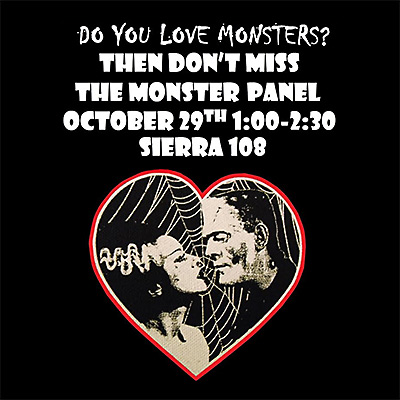
If the sight of blood makes you faint, please do not visualize descriptions in the following report.
Our favorite monster stories originate from very real human fears, and Truckee Meadows Community College faculty experts are “dying” to fill you in on vampires, zombies and cranial modification. Several unique events are happening during the month of October on the topic of real and imagined monsters that have frightened people throughout time.
The Monster Panel is an annual event at TMCC where professors and the audience dress in costume, gathering together to talk about monsters within and from far away. Refreshments are served and the event is free and open to the public.
When: Thursday, Oct. 29 from 1-2:30 p.m.
Where: Sierra Building, room 108
TMCC’s Library Committee has partnered with the Washoe County School District’s Read & Succeed volunteers to host a book drive. Two large bins have been placed in the V. James Eardley Student Center. The childrens’ books collected will be distributed to those in need from our community as trick-or-treat goodies.
The “mad” panel of professors this year includes:
- John Adlish, Microbiology
- Christine Boston, Anthropology
- Hugh Fraser, English
- Meeghan Gray, Biology
- Jennifer Huntley-Smith, Humanities
- Marynia Giren-Navarro, Sociology
“I'm talking about the anthropology of aliens,” said Christine Boston. “Dr. Adlish will illuminate monsters within us – pathogens that are scarier than fiction.”
Some conspiracy theorists have suspected alien visits to Earth based on human skeletal remains with deformed skulls – one theory is that people wanted to look more like aliens, she said. However, scholarly experts believe that purposeful or accidental reshaping of the skull had nothing to do with extraterrestrials.
“Boards flattening the skull or tight bindings have been used to reshape the head throughout history for a variety of reasons – to differentiate slave from free groups, or for beautification,” Boston said. “Some groups have even thought modifying the shape of the skull would make them smarter.”
The ancient Maya purposely elongated their heads to make them shaped more like corn. They believed that in the beginning the gods made them from corn and their devotion would please their gods, Boston said.
Marynia Giren-Navarro will put the spotlight on how social attitudes about death have changed throughout time.
“Her talk will be fascinating,” Boston said. “Victorians kept the hair from their deceased loved ones on dolls. This practice eventually evolved more recently into ladies keeping a lock of hair from their boyfriends in a locket while he is away from home.”
In the Victorian Era, cemeteries were close to town, and typically in churchyards.
“Nowadays, we keep death more far away, putting cemeteries farther from our homes,” Boston said.
Great Basin Geeks Convention
Boston will also present a talk called “Slaying the Vampire Mythos” at Great Basin Geeks Convention on Sunday, Oct. 18 at 1 p.m. The location of the free presentation is Reno Town Mall on S. Virginia Street and Peckham Lane.
“Beliefs about vampires came from the time before the Age of Enlightenment—so before the scientific revolution of the 1700s—when people wanted to make sense of things they didn’t understand,” Boston said. “When we die our bodies lose fluids, and because of that there is an illusion of hair and nails growing. Growth is something we associate with life, so the notion of vampires began.”
She adds that the mysteries of genetic blood diseases, and insufficient knowledge about contagious illnesses such as tuberculosis also led people to try and make sense of something that was scary.
“Tuberculosis was deadly – it was so scary that people needed to explain how it was spread,” she said. “Why did people suffering from TB lose even more blood when they died? So they dug up corpses, staked them in the heart and reburied them.”
With the Enlightenment, and the development of scientific processes, the myth of vampires became more romanticized. They became alluring characters who lived forever, got away with things, and were sexual creatures who bit the necks of their lovers, she added.
For more information about any of the unconventional talks coming up, please email Boston in the Anthropology Program at TMCC.






